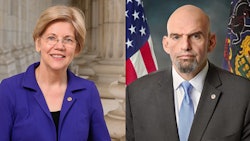
“Yesterday's news regarding the DOJ proposal to move cannabis from Schedule I to Schedule III is of tremendous importance and substance and should be applauded,” said former U.S. Deputy Attorney General James M. Cole during a media call hosted by the Coalition for Cannabis Scheduling Reform (CCSR), the National Cannabis Roundtable (NCR) and the Minority Cannabis Business Association (MCBA) to discuss the April 30 announcement by the U.S. Department of Justice/Drug Enforcement Administration that it is proposing to reschedule cannabis from a Schedule I drug to a Schedule III drug under the Controlled Substances Act.
Cole rose to fame in the cannabis industry for the Cole Memorandum, issuing guidance in 2013 that the federal government should not intervene in state-legal cannabis programs.
“The determinations by the Department of Health and Human Services [HHS] and the Drug Enforcement Administration [DEA] that cannabis should be reclassified to Schedule III shows a significant recognition that cannabis has medical value,” Cole said. “We have the FDA, the NIDA, and HHS all pointing to that fact. This is truly historic, and its importance can't be overstated. Moving cannabis to Schedule III is an important first step.”
While Cole said the move “will allow for far greater opportunities to study the medical applications of cannabis beyond what has been done to date,” he also said “it doesn't solve all of the issues presented by the current approach to the regulation of cannabis in this country.”
He pointed to the fact that 38 states have legalized cannabis in some form and established regulations to ensure consumer access to safe products, “guard against criminal elements conducting illicit business,” and provide states with revenue to fund not only cannabis regulatory agencies but also to drive state tax revenue to support “other important services to their citizens and residents.”
The federal government’s “failure … to join in this regulatory program has created a vulnerability that may ultimately allow the illicit market to prevail and eventually destroy all of these protections,” he said. “With that will come all of the ills that so many have worked for so long to prevent. For example, right now, cannabis is a predominantly cash business that brings with it the real threat of armed efforts to steal the proceeds of the business and the need to meet that armed aggression with armed protection. This is not a recipe for public safety. What is really needed to resolve this and other challenges and threats to public safety is for Congress to act to create a unified regulatory environment that involves both the states and the federal government.”
If that happens, he said, what will follow is “the availability of the prerequisites for normal business, access to banking services, access to capital markets, access to lending facilities, and the ability to fund small business loans to diverse populations to allow them access to the industry.”
“I believe, like Jim, that this action is an important step forward in the rational regulation of cannabis,” said Howard Sklamberg, partner at law firm Arnold & Porter and former FDA Deputy Commissioner. “It's immediate effect when it is finalized would be on the finances and having a rational approach to the taxation of cannabis businesses that like any other business, they can deduct their legitimate business expenses, which is a very big deal.”
In his role as Deputy Commissioner at the FDA, Sklamberg noted, “one of my jobs there was to be chair of FDA's Marijuana Working Group from 2014 to 2017 in developing the policy FDA had … and indeed interpreting the Cole Memorandum that Jim issued while in the Department of Justice.”
He said, “Once the FDA puts out its rule, and there'll be notice and comment and then there'll be a final rule, there will be an opportunity for judicial review and of course subject to any political changes that occur at the end of the year.”
Some in the industry have speculated whether or not the rule would hold up to judicial review; on this point, Sklamberg voiced optimism that it would. “The … FDA and HHS analysis is solid,” he said. “The folks who perform that analysis … are people who've worked on this issue and on controlled substances for decades, and their analysis is based on dozens and dozens of articles and studies. And what's important is that the FDA and HHS analysis noted how the landscape has changed in terms of our knowledge of cannabis since the last time the agencies looked at that issue back in 2015. … I will say that the solid scientific foundation makes the likelihood of challenging it in court much lower, and so I'm very much comforted by that.”
Sklamberg agreed with Cole that rescheduling cannabis doesn’t solve all the issues, particularly those facing the state-legal cannabis industry. “It’s an important first step, but not a final step because rescheduling from Schedule I to Schedule III does not change cannabis’s status in FDA's regulatory framework, which is to say the Food, Drug, and Cosmetic Act applies the same way to a substance that is Schedule III as it does to Schedule I, which means there is still regulatory uncertainty.”
Cannabis business, he said, are “basically operating under the enforcement discretion of federal agencies and subject to a whole bunch of different state rules. And one of the things for the cannabis business, as with any business, is you really want to know what the rules are, and you want those rules to be clear so you can follow them. And if you have clear rules, that also provides the maximum consumer protection as well.”
Tahir Johnson, president of the Minority Cannabis Business Association (MCBA) and CEO of Simply Pure Trenton cannabis dispensary, also agreed that the move to reclassify cannabis is “an important first step,” and he thanked and commended President Biden “for his leadership in moving toward the reclassification of cannabis.”
“What we've all ended up recognizing …, what many of us have known for over 50 years, is we saw cannabis scheduled as a Schedule I drug with the assumption that there's no medical value and a high potential for abuse,” Johnson said. “And righting that wrong with rescheduling is recognizing the fact that cannabis does have medical value with over 38 states and Washington, D.C., currently with medical programs that are helping people all over the country. And so this reclassifying cannabis will be a critical great step for business owners, mostly … being able to peel back [Internal Revenue Code, Section] 280E and the impact that it has on cannabis businesses will be something that's great for the entire industry, but especially for minority business owners who are financially less stable.”
The impact, he said, will be significant. “Being able to not have 280E will help us to be able to build our businesses and to be able to put money back into our community, which is an incredible thing.”
Johnson also said there is more work to be done. “We know that the job doesn't stop here today as what's important is that we fully deschedule cannabis, but this is a great first step and a historic step towards normalizing cannabis and also repealing some of the stigma that has been faced by the industry,” he said. “So, I'm very hopeful on what this means for the future and how this will positively impact and hopefully lead to the full descheduling of cannabis one day as it should be.
The Cole Memo Redux: Will State-Legal Business Be Protected?
Speaking to whether a new memo (akin to the Cole Memo) might be issued to offer guidance protecting state-legal cannabis programs and businesses, and whether the DOJ may decide to be hands-off should interstate cannabis commerce commence, Cole said, “Certainly, it's hard for me to speak for DOJ presently. But I think obviously you've got an enormous step forward with the decision to reschedule. It shows an institutional softening of the position, both at DOJ and even more significantly at DEA.”
He also said that his famous memo “seems to still have some lingering effect.”
“It's always a good idea every 10 years or so to take a look at something and see if it needs to be tweaked and if it needs to be improved and what lessons are learned,” he said. “Knowing a lot of people at the Justice Department, these are very smart and very able administrators, and people who run the department really know what they're doing. I think it's probably likely they will consider the issue and determine whether or not any further guidance is necessary once the rule has taken effect.”
While what that guidance might be would be “hard to predict,” Cole reiterated the need for clear rules cannabis businesses can abide by. “I think in essence, it's usually a good idea to let everybody know where the federal government stands on prosecution and what the guardrails are going to be.”
Addressing speculation that the Biden Administration may issue a new “Cole Memo,” Cole said he believes to do so would first “require some study and basically consultation, importantly with the states, to identify some of the more sensitive areas that they've experienced over the past 10 years.”
One example, he said, is that there may be a need to address regulations around cannabis gummies and other “candy-like substances” whether manufacturers are “making those attractive to younger people.”
“It becomes confusing, and there may be some need to regulate that a little bit. Some of the vaping markets can use a lot of flavoring, which can appeal to younger people,” he said. “I think some of those issues need to be examined to make sure that the protections for underage people using it and the attractiveness that's being marketed that may appeal to young underage people needs to be dealt with.”
The unregulated market is another area Cole noted as possibly needing to be addressed.
“I think you've got to take a look at where the black market is going right now and probably adjust the memo to take that into account and make sure that prosecution of the black market is stepped up, both state-wise and federally,” he said. “Because to me, the key to all of this is the maintenance of a legitimate and well-regulated business. That's how you're going to ensure public safety in this area.”
Sklamberg weighed in with some perspective gleaned from his prior role with the FDA. “FDA has not issued any kind of formal enforcement discretion policy in this area, but it has obviously chosen what its priorities are, and it has not taken enforcement action against the medical cannabis market, against recreational cannabis products by and large, except for products making extreme claims in the CBD and hemp area,” he said.
“… I know there's some fear among some in the industry that oddly … the rescheduling of cannabis to Schedule III would somehow make FDA take more enforcement. And I think that's extremely unlikely to happen,” he said. “I do not see it changing FDA's priorities, and in fact, the rescheduling is an indication that the country's public health agency believes that cannabis is less of a public health risk than it had thought when it last analyzed the problem.”
What’s Next: The Timeline
With the DOJ’s proposal pending until it is reviewed by the White House Office of Management and Budget (OMB), and a public participation period is completed, the timeline for when the proposed rule would actually become a final rule has been a question on much of the industry’s minds.
“It’s at the White House, you would think that it'll move pretty quickly given that the whole world knows that they're looking at it,” Sklamberg said. “And it would be the strangest thing in the world if OMB all of a sudden were to reverse this. And so you imagine they'll do that pretty quickly. There'll be a comment period of say two, three months, and then there will be a final rule.”
Sklamberg said he would be “very surprised” if a final rule was not issued this year “before the administration ends, and probably before November.”
“That can be accomplished if the proposed rule comes out pretty quickly and if they work fast. That's not the speed they have worked in the past on this issue, but there is a greater sense of urgency.”
Once there is a final rule, however, Sklamberg said, “People can sue, and it's a big country, so maybe people will. There are questions of who would have standing and all that, which I'm not going to get into here. And then it depends on the election, but I don't see a heck of a lot of opposition, frankly, to changing from Schedule I to Schedule III, just some sporadic words from some Congressmen, but there isn't really a strong opposition that I've seen.”
Regarding when the removal of 280E would take effect, Cole said, “Making it Schedule III removes 280E from its application. When it will take effect is when the rule becomes final, and unless it is somehow stopped through a temporary restraining order or something of that nature in the courts, once it becomes final, that will take place. Probably the key ... and I'm not a tax lawyer, but the key is going to be whether or not it becomes final in time for the filing of returns. That would be impacted by 280E by each of these businesses.”
Enter Big Pharma?
Addressing whether the Schedule III classification would make it easier for pharmaceutical interests to step onto the medical cannabis playing field, Sklamberg said, “There's disagreement among some about how this will affect the ease of doing research, but the fact is that in order for pharma to get involved, they would have to submit new drug applications and go through the process of clinical trials to get an approval for a specific indication of a drug. And they have not had any desire to do so in the past. And I don't think that environment has changed much at all. And the framework for doing so has not.”
Whether a particular company will “want to put the money in to do the clinical trials, to file a new drug application for one specific indication for cannabis with lots of competition out there, and what would then be the follow-up steps,” Sklamberg said, “I look at that and I think practically speaking, I don't see that happening.”


























